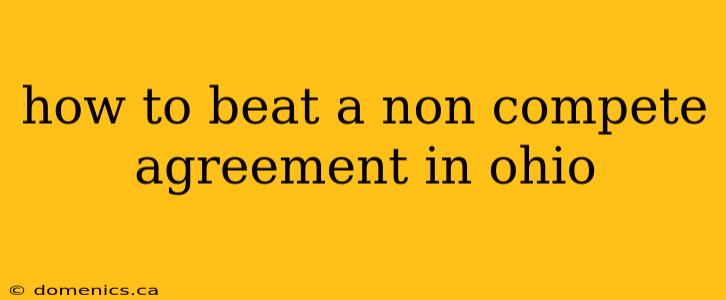Non-compete agreements are common in Ohio, especially for employees in specialized fields. These agreements restrict your ability to work for a competitor or start your own business after leaving your current employer. However, Ohio courts don't automatically uphold all non-competes. Understanding the nuances of Ohio law can significantly increase your chances of successfully challenging one.
Understanding Ohio's Non-Compete Laws
Ohio courts carefully scrutinize non-compete agreements. They won't enforce a contract simply because it exists. The agreement must meet specific criteria to be legally sound. These criteria center on reasonableness. A court will consider whether the restrictions are reasonable in terms of:
- Time: How long the restrictions last.
- Geography: The geographic area covered by the restrictions.
- Scope of Activity: The types of work or businesses prohibited.
If any of these aspects are deemed unreasonable or overly broad, the court might refuse to enforce the entire agreement or modify it to be more reasonable. This is a crucial aspect of how you might "beat" a non-compete.
Grounds to Challenge a Non-Compete Agreement in Ohio
Several grounds exist to challenge the enforceability of a non-compete agreement in Ohio. These are often intertwined and frequently used in combination. Let's explore some of the most common:
1. Unreasonable Restrictions
As mentioned earlier, reasonableness is paramount. If the agreement's restrictions on time, geography, or scope of activity are excessively broad, they can be grounds for challenge. For example, a non-compete that prohibits you from working anywhere in the state of Ohio for five years after leaving your job would likely be considered unreasonable.
2. Lack of Consideration
Ohio law requires "consideration" for a contract to be valid. This means that both sides must receive something of value. If you signed the non-compete agreement after you started your job, the court may find a lack of consideration, making the agreement unenforceable. Your continued employment might not be enough consideration if the agreement was signed after you were already employed.
3. Change in Circumstances
If your circumstances have changed significantly since signing the agreement (e.g., you were promoted to a position with significantly more responsibility, or your employer drastically changed the nature of your job), you might argue that the original agreement is no longer applicable.
4. Unconscionability
An agreement is unconscionable if it's so one-sided or unfair that it shocks the conscience of the court. This typically arises when one party has significantly more bargaining power than the other. This is especially relevant if you were presented with the agreement as a "take-it-or-leave-it" proposition with little opportunity for negotiation.
5. Public Policy
A non-compete agreement that violates public policy—for instance, one that unduly restricts competition or prevents you from providing essential services—can be challenged.
How to Proceed
Challenging a non-compete is a complex legal process. It’s not something to take lightly and attempting it alone is strongly discouraged. Here’s a crucial initial step:
Seek Legal Counsel Immediately: Consult with an experienced Ohio employment lawyer. They can review your specific agreement, assess its enforceability, and advise you on the best course of action. They'll understand the intricacies of Ohio law and can help you build a strong case. This is absolutely vital.
Frequently Asked Questions (FAQs)
Q: What should I do if my employer is threatening to enforce a non-compete?
A: Document everything related to your employment and the non-compete. Keep copies of your agreement, emails, and any other relevant communication. Immediately contact an employment attorney.
Q: Can I negotiate a non-compete agreement?
A: Possibly. Before signing, you might be able to negotiate more reasonable terms, but this requires careful consideration and potentially legal guidance.
Q: What if I violate a non-compete unintentionally?
A: Even unintentional violations can lead to legal repercussions. Seeking legal counsel is crucial in such situations.
Navigating a non-compete agreement in Ohio requires careful attention to detail and a clear understanding of the law. Seeking professional legal advice is your best course of action to protect your rights and career. Remember, while this article provides information, it is not a substitute for professional legal counsel. Always consult with an attorney before taking any action regarding a non-compete agreement.
